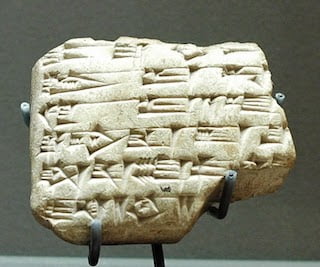 Since You aren’t talking, no matter how much Job knows of You, I can understand why he starts questioning what is happening to him.
Since You aren’t talking, no matter how much Job knows of You, I can understand why he starts questioning what is happening to him.
But I guess that’s what faith is all about: Knowing without seeing. If You answered all of our questions or showed us things then we wouldn’t need 1 faith.

The Mari Tablets (1800 – 1750 B.C.)
The city of Mari is located on the western banks of the Euphrates River, approximately 250 miles north of Babylon.
Archaeology has shown the city flourished from 2900 B.C. to 1759 B.C., at which point it was sacked by Hammurabi.
Mari was a part of the Amorite kingdom which dominated Mesopotamia in the 18th century.
The Akkadians established this empire from Babylon, northeast to Asshur, northwest to Haran, and across to the Mediterranean.
Abraham is believed to have existed during the reign of this Amorite kingdom.
His journey from Ur to Haran more than likely carried him through the city of Mari.
The Akkadians in Mari kept impeccable records of their kingdom.
These record would lead historians to rewrite the historical time line of the Ancient Near East.
In the 1930’s over 25,000 Akkadian tablets were discovered in the archives of Mari.
These tablets provided invaluable information on the kingdom of Mari, its customs, culture, religion, and even names of people.
These tablets date to the last fifty years of Mari’s independence,
1800 – 1750 B.C.
The Mari tablets revolutionized the view of the ancient world by shedding light on over 500 name of different places.
Important discoveries were also made on the identity of the SA.GAZ/Haberi/Habiru, and their interactions with the Akkadians of this time.
“Moreover Job continued his parable, and said,
Oh that I were as in months past, as in the days when God preserved me;
When his candle shined upon my head, and when by his light I walked through darkness;
As I was in the days of my youth, when the secret of God was upon my tabernacle;
When the Almighty was yet with me, when my children were about me;
When I washed my steps with butter, and the rock poured me out rivers of oil” (Job 29:1-6).
by his light I walked – Words charged with emotion. In earlier days, God had been Job’s friend and companion.
“When I went out to the gate through the city, when I prepared my seat in the street!” (Job 29:7)
Gate through the city – The city gate was where the most important business was conducted and the most significant legal cases were tried.
“The young men saw me, and hid themselves: and the aged arose, and stood up.
The princes refrained talking, and laid their hand on their mouth.
The nobles held their peace, and their tongue cleaved to the roof of their mouth.
When the ear heard me, then it blessed me; and when the eye saw me, it gave witness to me.
Because I delivered the poor that cried, and the fatherless, and him that had none to help him.
The blessing of him that was ready to perish came upon me: and I caused the widow’s heart to sing for joy” (Job 29:8-13).
I delivered…the fatherless…caused the widow’s heart to sing – Implicitly responding to Eliphaz’s accusation in 22:9, Job expresses his concern for the helpless and unfortunate (see 24:9; 31:16-18, 21).

Akkadian, or Assyro-Babylonian, is the oldest attested written language – the code for the cuneiform writing system.
Texts written in Akkadian date back as early as 2800 B.C., and although it hasn’t been spoken for well over two thousand years, the language can be considered invaluable to the unraveling of the first human civilizations from Mesopotamia.
A hundred years in the making, the last volume in a exhaustive series of Akkadian dictionaries was finally completed and released by scholars at the University of Chicago.
The 21 complete volumes have been elaborated as a result of pain painstakingly analyzing and deciphering hundreds of thousands of clay tablets.
The project was initiated in the early 1920s by James Henry Breasted, who also founded the Oriental Institute at the Chicago University in 1919; this was just a hundred years after cuneiform was first discovered.
Now complete, the Akkadian dictionary is intended as a window to the oldest culture known to man.
Gil Stein, the current director of the university’s Oriental Institute, said “[it] is an indispensable research tool for any scholar anywhere who seeks to explore the written record of the Mesopotamian civilization.”
Progress has been sluggish, with all the 90 years needed to complete just 21 volumes and all, but considering scholars had to go through deteriorated tablets, constant new finding from exhalations and such I think they did a pretty good job.
What’s remarkable in the with 28,000 defined words dictionary is that for most of the words, especially important, generic terms, you’ll find whole pages dedicated to explaining the meaning and contextualization of these words.
There are, for example, 17 pages devoted to the word “umu,” meaning “day.”
Considering Akkadian is a dead language, a more encyclopedic variant of the dictionary was indeed warranted.
“I put on righteousness, and it clothed me: my judgment was as a robe and a diadem.
I was eyes to the blind, and feet was I to the lame.
I was a father to the poor: and the cause which I knew not I searched out.
And I brake the jaws of the wicked, and plucked the spoil out of his teeth.
Then I said, I shall die in my nest, and I shall multiply my days as the sand.
My root was spread out by the waters, and the dew lay all night upon my branch.
My glory was fresh in me, and my bow was renewed in my hand.
Unto me men gave ear, and waited, and kept silence at my counsel.
After my words they spake not again; and my speech dropped upon them.
And they waited for me as for the rain; and they opened their mouth wide as for the latter rain.
If I laughed on them, they believed it not; and the light of my countenance they cast not down.
I chose out their way, and sat chief, and dwelt as a king in the army, as one that comforteth the mourners (Job 29:14-25).
believe it not – were astonished when someone as important as Job would smile at them.
1 Now faith is the substance of things hoped for, the evidence of things not seen.
But without faith it is impossible to please him: for he that cometh to God must believe that he is, and that he is a rewarder of them that diligently seek him” (Heb 11:6).
A Man and His God

Only 200 or so people in the world are fluent in the Akkadian language.
Scholars learned to read the language through hundreds of thousands of written documents left behind by the Mesopotamian people who spoke it for 2,000 years.
The documents are clay tablets covered in cuneiform: little, wedge-shaped characters that represented Akkadian words.
Akkadian was one of the world’s first written languages, evolving more than 4,000 years ago in Mesopotamia, the birthplace of human civilization between the Tigris and Euphrates Rivers in what is modern-day Iraq.
A broken Akkadian tablet from the Old Babylonian period, sometimes called A Man and His God, describes the lament of a young man who is suffering from some dreadful but unspecified disease. He groans, weeps, and cries out to his god for help.
Although the text is fragmentary, it’s clear that the man wrestles with question of how he may have sinned against his god and concludes that he has committed blasphemy. In the end, his god pronounces a blessing on him, promises that he will prosper and encourages him to donate food to the poor.
At first glance the tablet may strike many readers as being similar to Job, with its pitiable account of the sufferer’s lamentation, his struggle with the problem of sin and divine justice and his final deliverance by divine.
An important difference between the two texts, however, is that the young man of the Akkadian text finally recognized and confessed his sin, whereas Job expressly declared himself to be a righteous man who was suffering because of his virtue and not because of some sin.
The Akkadian text thus lacks the profundity of the problem posed by Job: that of the righteous sufferer.
Visits: 0
